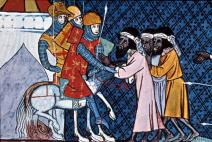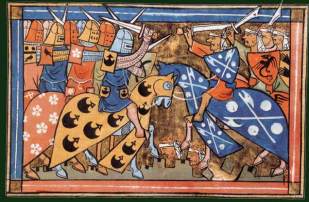Lezlie Knox points us to historians’ reactions to presidential candidate Carly Fiorina’s recent statement comparing the Crusades and the current events in Syria.
Last spring I wrote a brief post sharing some links of medievalists responding to problematic comparisons of the Crusades to the current situation in Syria. Given Carly Fiorina’s recent boast at a New Hampshire townhall that her undergraduate training in medieval philosophy and history at Stanford prepared her to challenge the Islamic State/ISIS, it’s worth reading these wonderful ripostes.
David Perry, historian of the Crusades and an active blogger, wrote an op-ed in The Guardian. Just yesterday, Bruce Holsinger, medieval literary scholar and historical novelist, published a piece in the New York Times. Both essays are worth reading for their analysis of ahistorical invocations of the Middle Ages and its implications. Moreover, I particularly want to draw attention to the closing of Holsinger’s piece. He points out the Fiorina’s remarks are particularly distressing because she  has been a defender of the value of the Humanities.
has been a defender of the value of the Humanities.
The most valuable course she took at Stanford, she told the graduates, wasn’t economics or politics, but a seminar called “Christian, Islamic and Jewish Political Philosophies of the Middle Ages.”
Each week, she explained, students had to distill what they’d read into a mere two pages: “The rigor of the distillation process, the exercise of refinement, that’s where the real learning happened. It was an incredible, heady skill to master. Through the years, I’ve used it again and again — the mental exercise of synthesis and distillation and getting to the very heart of things.”
Rarely has the value of humanistic education been defended so eloquently. Whatever your politics, I tell my students, take heart. When your annoying Uncle Fred asks why you’re majoring in philosophy instead of commerce, tell him you know of a Fortune 500 C.E.O. who majored in medieval studies — not only majored in it, but also credits it with shaping her into the successful public figure she became.
We also can look forward to scholars of Ancient Greece taking on Marco Rubio’s assertion that studying Greek Philosophy is useless….
Lezlie Knox is associate professor of history, Director of Graduate Studies, and the author of Creating Clare of Assisi: Female Franciscan Identities in Later Medieval Italy (Brill, 2008).
